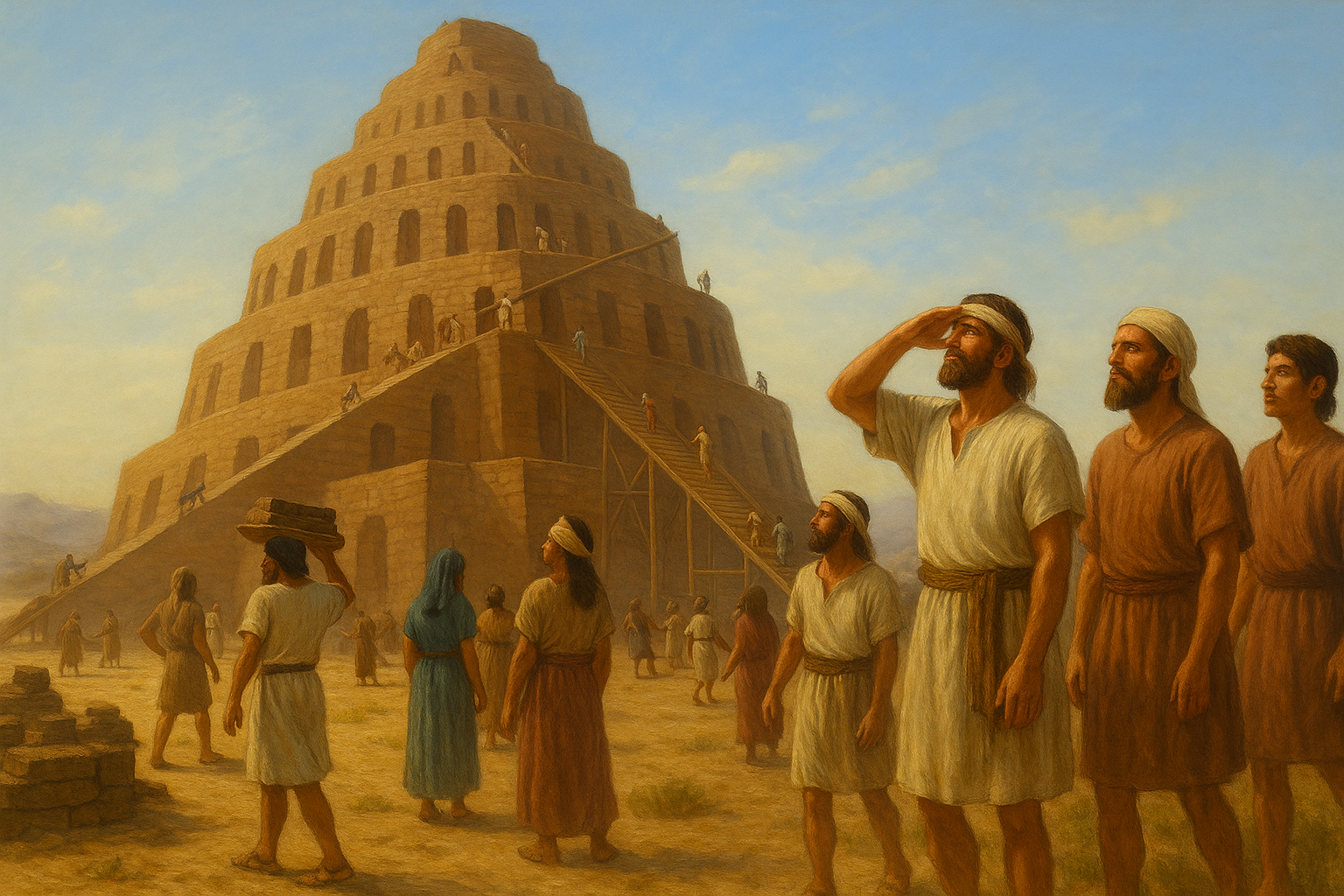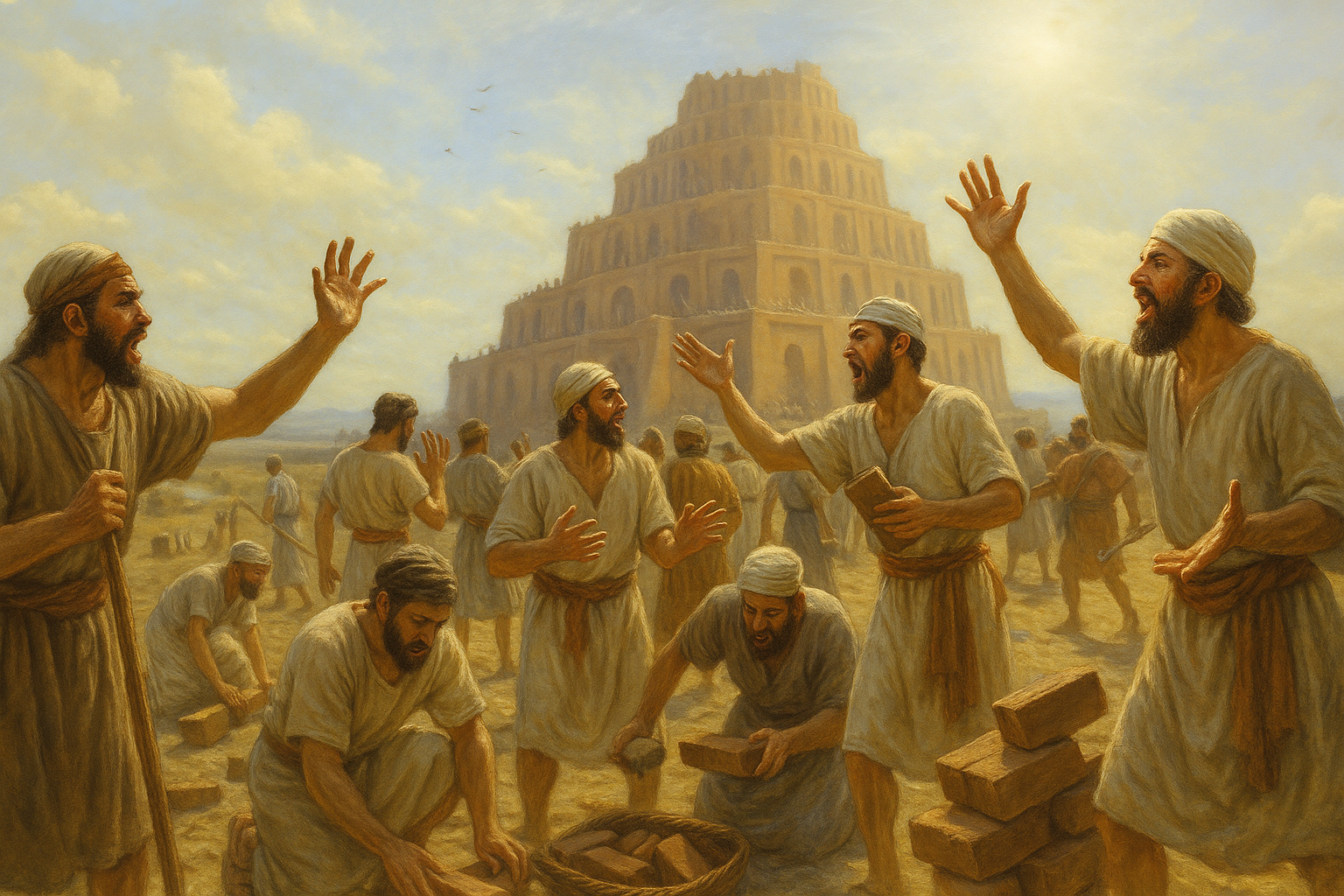The Tower of Babel (Genesis 11)
Why do people strive to be the greatest?
Building the Tower of Babel
The Question of Greatness
Have you ever watched children stack blocks?
At first, they laugh and build together. But soon one wants it taller — taller than anyone else’s.
And then, with one shaky move, the tower tumbles down.
From the very beginning, people have wanted to reach higher.
To build something that lasts.
To make a name for ourselves.
Genesis tells us that long ago, “the whole earth had one language and the same words.” (Genesis 11:1)
With one voice, humanity dreamed the same dream — to climb as high as heaven.
But in that dream, pride took root.
Constructing the Tower of Babel
A Tower That Reached Heaven
In the land of Shinar, people began to build a great city.
They said to one another,
“Come, let’s build ourselves a city and a tower with its top in the heavens. Let’s make a name for ourselves; otherwise, we’ll be scattered over the face of the whole earth.” (Genesis 11:4)
There’s nothing wrong with working together or dreaming big.
The problem was why they were building.
They didn’t want to honor God — they wanted to replace Him.
They wanted safety and fame apart from the One who had created them.
Instead of spreading through the earth as God had commanded, they gathered and exalted their own strength.
Their unity became pride, and their progress became rebellion.
Confusion at the Tower of Babel
When Words Turned to Babble
Until that moment, everyone spoke the same language.
One word, one voice, one shared understanding.
But then came the turning point:
“The Lord said, ‘Come, let Us go down and confuse their language so they will not understand one another.’ So the Lord scattered them from there over the face of the whole earth.” (Genesis 11:7–8)
In an instant, words became noise.
Plans crumbled, sentences broke apart, and neighbors could no longer understand each other.
What had been one people became many nations.
What had been one tongue became many languages.
That’s where the name Babel comes from — the root of our word babble.
It means confusion.
And we still live in that echo today.
When you hear a language you don’t understand, when nations argue and cultures clash — you’re hearing the ripples of Babel.
Human pride built walls where God had created bridges.
Our own striving scattered us.
Work on the Tower of Babel abandoned
God Comes Down
Then, something humbling and almost tender happens in Scripture:
“The Lord came down to see the city and the tower that the men were building.” (Genesis 11:5)
It’s a simple phrase — but a powerful one.
Even humanity’s tallest tower was so small that God had to “come down” to see it.
Pride makes us think we can rise to heaven.
Grace reminds us that heaven stoops down to us.
God’s response wasn’t cruel; it was merciful.
He stopped their building not to punish them, but to protect them from the kind of pride that destroys.
He scattered them so they would seek Him again — not in the clouds, but in their hearts.
The ruins of the Tower of Babel are beneath a rainbow
From Babel to Pentecost
Centuries later, God reversed the curse of Babel in a most beautiful way.
In Acts 2, on the day of Pentecost, the Holy Spirit filled Jesus’ followers — and suddenly they began to speak in many languages, each one understood by people from every nation.
What pride had divided, the Spirit now united.
What human ambition had scattered, divine grace gathered.
God didn’t erase the languages He had created — He redeemed them.
And once again, one message rose from many voices:
Jesus Christ, the Savior of the world.
The Holy Spirit decends at Pentecost in the upper room
The story of Babel asks us:
What towers are we building today?
Whose name are we lifting higher — ours, or God’s?
Pride still builds walls.
But Jesus builds bridges.
He speaks through every language, every culture, every heart that will listen.
At Babel, God scattered proud people who tried to climb to heaven.
At Pentecost, heaven came down through His Spirit to dwell in humble hearts.
What “tower” in your life might be built on pride instead of trust in God?
Jesus unites us by His Spirit — the same Spirit that turns confusion into understanding, and division into peace.
Teaching Outline: The Tower of Babel
Scripture: Genesis 11:1–9
Big Idea: Pride leads to confusion, but God’s Spirit brings unity.
Focus on Jesus: Jesus unites us by His Spirit (Acts 2).
I. One People, One Language
In the beginning, all people spoke one language and lived together in unity.
“Now the whole earth had one language and the same words.” — Genesis 11:1
This was a rare time of worldwide cooperation — but without God at the center.
The people’s unity was powerful, but their motives were prideful.
Unity without obedience is not true harmony — it’s rebellion dressed as progress.
II. The Desire to Be Great
Humanity said:
“Come, let’s build ourselves a city and a tower with its top in the sky. Let’s make a name for ourselves; otherwise, we will be scattered over the face of the whole earth.” — Genesis 11:4
The tower was likely a ziggurat, a stepped structure common in ancient Babylon.
Their goal was not to honor God but to exalt themselves — “Let’s make a name for ourselves.”
They wanted to reach heaven without God’s help — the first monument to human pride.
a. Pride says, “I don’t need God.”
b. Pride tries to climb upward when humility kneels downward.
III. God Comes Down
God saw their tower and their hearts.
“Then the Lord came down to look over the city and the tower that the humans were building.” — Genesis 11:5
This verse is poetic irony — mankind tries to build up, but God still must “come down” to see it.
God was not threatened by their tower — He was concerned for their hearts.
When people unite in pride, their power multiplies their corruption.
God’s confusion of language was not punishment only — it was mercy.
He stopped them from destroying themselves through arrogance.
IV. Confusion and Scattering
“So the Lord scattered them from there over the face of the whole earth, and they stopped building the city.” — Genesis 11:8
God confused their speech so they could no longer understand each other.
The word Babel comes from the Hebrew balal, meaning “to confuse.”
It’s also the root of our word babble — meaningless noise without understanding.
The scattering was both judgment and grace — humanity would fill the earth as God originally commanded in Genesis 1:28.
V. The Lesson of Babel
Pride builds towers — humility builds altars.
When we try to reach heaven on our own, we find confusion.
When we trust God, He lifts us higher than we could ever climb.
VI. The Promise Fulfilled in Christ
Centuries later, God reversed Babel’s confusion at Pentecost.
“All of them were filled with the Holy Spirit and began to speak in other tongues as the Spirit enabled them.” — Acts 2:4
“We hear them declaring the wonders of God in our own tongues!” — Acts 2:11
At Babel, languages divided humanity.
At Pentecost, the Spirit united humanity through the message of Jesus.
In Christ, we understand one another again — through the language of love.
Reflection Question
When you see division or confusion in your world, do you respond with pride or humility?
How can you become a builder of understanding through God’s Spirit?






